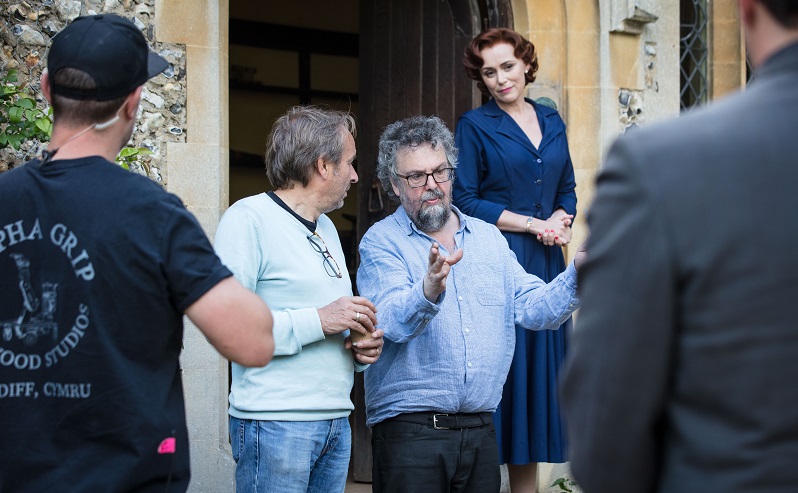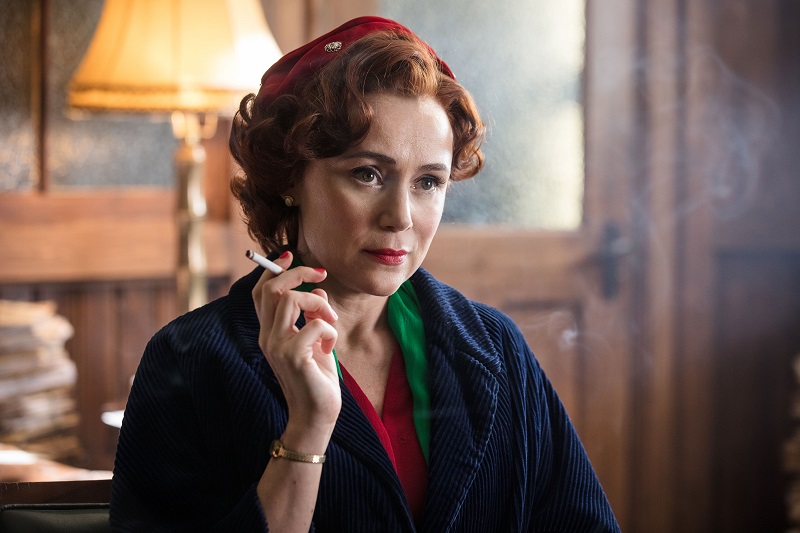Summer of Rockets writer Stephen Poliakoff: ‘MI5 accused my dad of spying’
BBC2 Cold War drama starring Keeley Hawes, Toby Stephens, Linus Roache and Timothy Spall was inspired by Poliakoff's Russian-Jewish father
The idea that Stephen Poliakoff’s Russian-born father was a Communist spy – and indeed one who extracted information from then-Prime Minister Winston Churchill – was not only unbelievable, but one that never fails to make the acclaimed screenwriter chortle at the mere thought.
“It’s totally astonishing,” he grins. “Dad was the least likely person involved in spying. He was a huge Anglophile and enormously in love with everything English. The idea of him bugging the Cabinet war rooms was extraordinary. I think he would have found such an accusation outrageous.”
Alexander Poliakoff, together with his father, Joseph, invented the pager and ran a firm that manufactured hearing aids, with a host of clients that included Churchill. But when MI5 head Roger Hollis harboured suspicions the pair had turned the premier’s hearing aid into a covert bugging device, they were promptly denied all access to 10 Downing Street.
Get The Jewish News Daily Edition by email and never miss our top stories Free Sign Up
Only years later, when Hollis’ memorandums on the matter became declassified, did Poliakoff learn the truth about why his father’s visits to Churchill were stopped.
The incredible story is just one of several real-life incidents that Poliakoff has drawn from for his semi-autobiographical drama, Summer of Rockets, which airs tonight on BBC2.
Samuel Petrukhin, played by Lost In Space actor Toby Stephens, is a Russian Jewish émigré and inventor of bespoke hearing aids, who finds himself approached by the British secret service after befriending Kathleen Shaw (Bodyguard star Keeley Hawes), her Tory MP husband Richard (Linus Roache) and the impressive Lord Arthur Wallington (Timothy Spall).
The gripping Cold War drama is set over just a few months during the summer of 1958, when the screenwriter himself was a young child.

Poliakoff, whose body of work includes Close to the Enemy, Dancing on the Edge and Perfect Strangers, explains: “It was a very tense time. The fear of nuclear war hung in the air, but it was also a moment when rockets first sent satellites into space and my father invented the pager, bringing about the birth of the world we recognise now. At the beginning of the summer, it was the last time debutantes were presented to the Queen and by the end, it was the Notting Hill riots, so there was also this sense of two Britains, one looking back at the empire and one in a changing world. That’s why I was attracted to 1958.”
Britain was also grappling with class divides and racial tensions, as shown in Summer of Rockets by the aristocracy’s cool reception of Petrukhin’s black business partner, Courtney (Gary Beadle), but so too were Jews treated unfavourably – something Poliakoff finds “extraordinary” given that the Holocaust had happened only years earlier.
The 66-year-old writer says: “I think people do forget the antisemitism that was around then – and still around today of course – especially among the upper classes. It ran right through the 1930s and after the war, but what I find so extraordinary is that even with all the revelations of the Holocaust, there was still this antisemitism. It just shows how embedded it was in Britain.”
It’s perhaps little wonder that Poliakoff’s father, being Jewish and Russian at a time of rising antagonism between his birth and adopted countries, came under suspicion as an enemy of the state while merely servicing Churchill’s hearing aid.
Still, there were a few “funny little vignettes” that Poliakoff recalls being told by his father about his visits to Number 10.

“He once told me about Churchill sitting up in bed with a glass of whisky and my father took a book for him to sign,” he smiles. “As he handed it to him, Churchill brusquely said, ‘I have written others, you know.’ Another time, my father and grandfather went through the wrong door and found themselves in a cabinet meeting.”
For his latest drama, Poliakoff has not only drawn upon his father’s experience as a Russian Jewish émigré living in Britain, but also his own “searing” childhood memories of being sent away to boarding school , as brought out in the character of Petrukhin’s son, Sasha, played by Toby Woolf.
“I had to tone down the school, because today it’s a charming place, but at that time it was a very, very tough place to be, with an extraordinary amount of physical hitting and a lot of savage sarcasm. It was quite Dickensian and there was a lot of viciousness.
“Interestingly, one of the reasons I ended up at this school was because the one my parents wanted to send me to in London – which would have been lovely and cushy with me living at home – had a Jewish quota and they didn’t want any more. It’s a stark reminder of what used to go on.
“I spent five years of my life there, over 50 years ago, and still find myself resenting my time there. It was quite a searing experience.”
Summer of Rockets airs on Wednesdays, 9pm, BBC2 and the full series is now available to watch on iPlayer

Thank you for helping to make Jewish News the leading source of news and opinion for the UK Jewish community. Today we're asking for your invaluable help to continue putting our community first in everything we do.
For as little as £5 a month you can help sustain the vital work we do in celebrating and standing up for Jewish life in Britain.
Jewish News holds our community together and keeps us connected. Like a synagogue, it’s where people turn to feel part of something bigger. It also proudly shows the rest of Britain the vibrancy and rich culture of modern Jewish life.
You can make a quick and easy one-off or monthly contribution of £5, £10, £20 or any other sum you’re comfortable with.
100% of your donation will help us continue celebrating our community, in all its dynamic diversity...
Engaging
Being a community platform means so much more than producing a newspaper and website. One of our proudest roles is media partnering with our invaluable charities to amplify the outstanding work they do to help us all.
Celebrating
There’s no shortage of oys in the world but Jewish News takes every opportunity to celebrate the joys too, through projects like Night of Heroes, 40 Under 40 and other compelling countdowns that make the community kvell with pride.
Pioneering
In the first collaboration between media outlets from different faiths, Jewish News worked with British Muslim TV and Church Times to produce a list of young activists leading the way on interfaith understanding.
Campaigning
Royal Mail issued a stamp honouring Holocaust hero Sir Nicholas Winton after a Jewish News campaign attracted more than 100,000 backers. Jewish Newsalso produces special editions of the paper highlighting pressing issues including mental health and Holocaust remembrance.
Easy access
In an age when news is readily accessible, Jewish News provides high-quality content free online and offline, removing any financial barriers to connecting people.
Voice of our community to wider society
The Jewish News team regularly appears on TV, radio and on the pages of the national press to comment on stories about the Jewish community. Easy access to the paper on the streets of London also means Jewish News provides an invaluable window into the community for the country at large.
We hope you agree all this is worth preserving.
-
By Brigit Grant
-
By Laurent Vaughan - Senior Associate (Bishop & Sewell Solicitors)
-
By Laurent Vaughan - Senior Associate (Bishop & Sewell Solicitors)
-
By Laurent Vaughan - Senior Associate (Bishop & Sewell Solicitors)
-
By Laurent Vaughan - Senior Associate (Bishop & Sewell Solicitors)





















